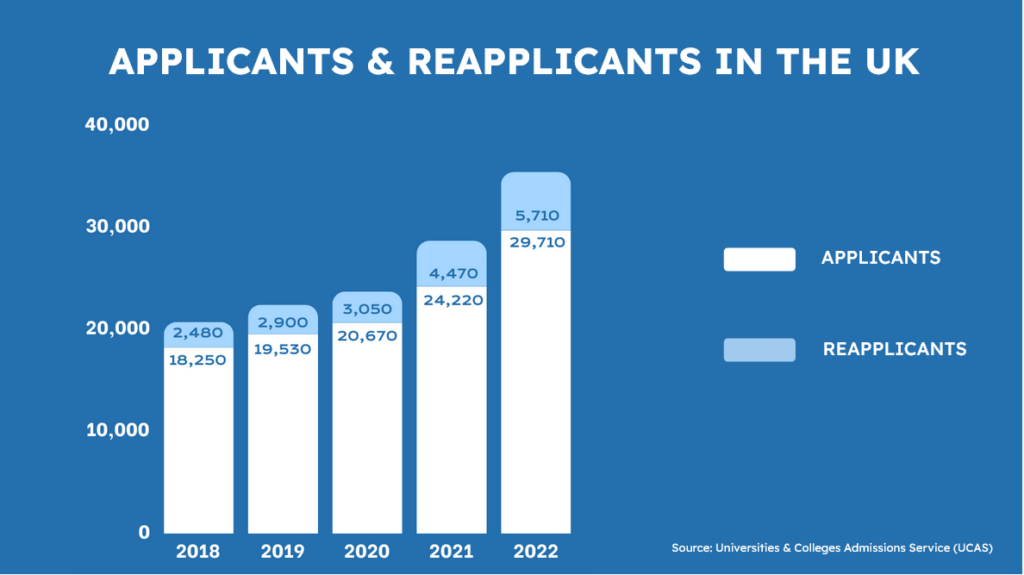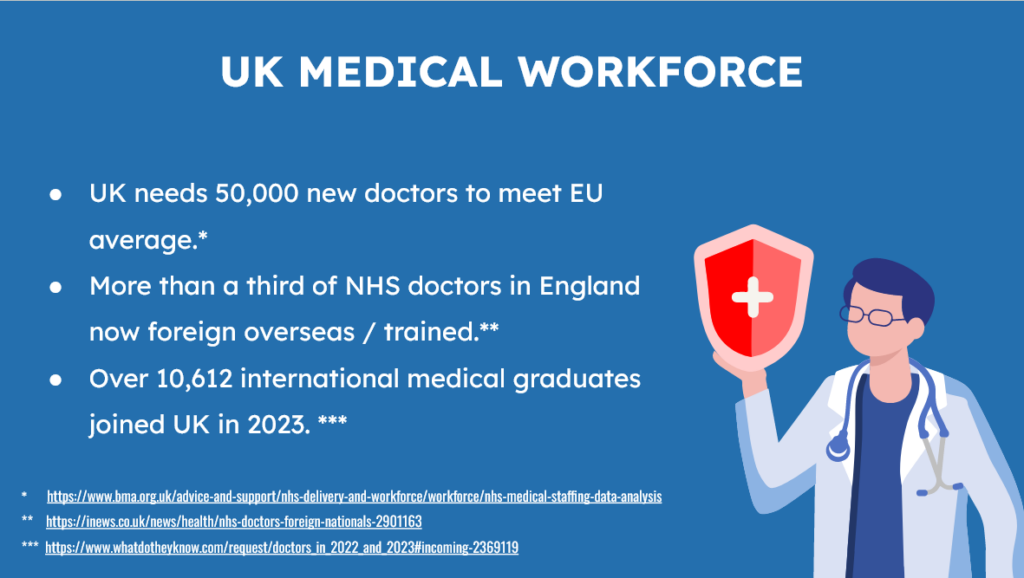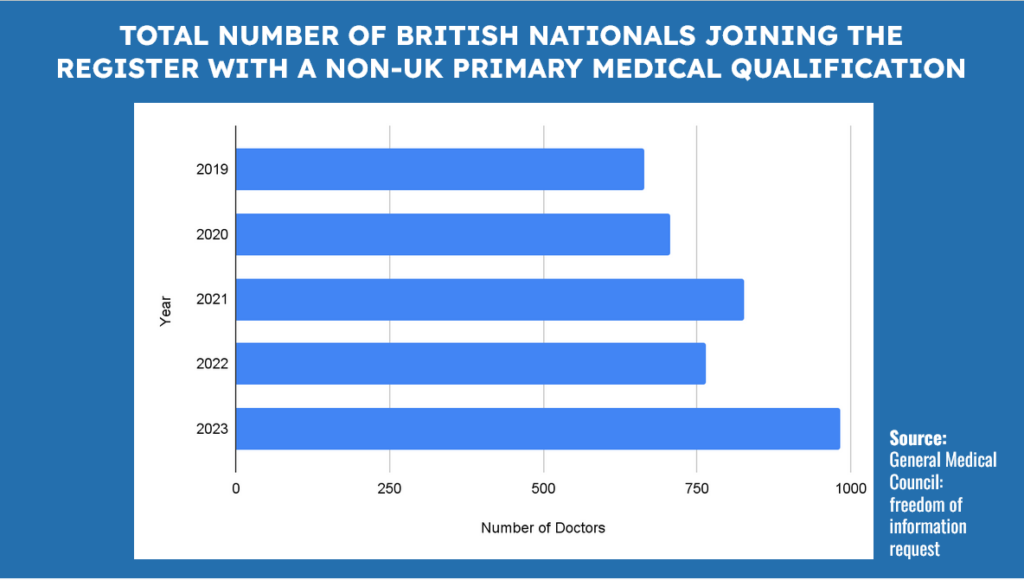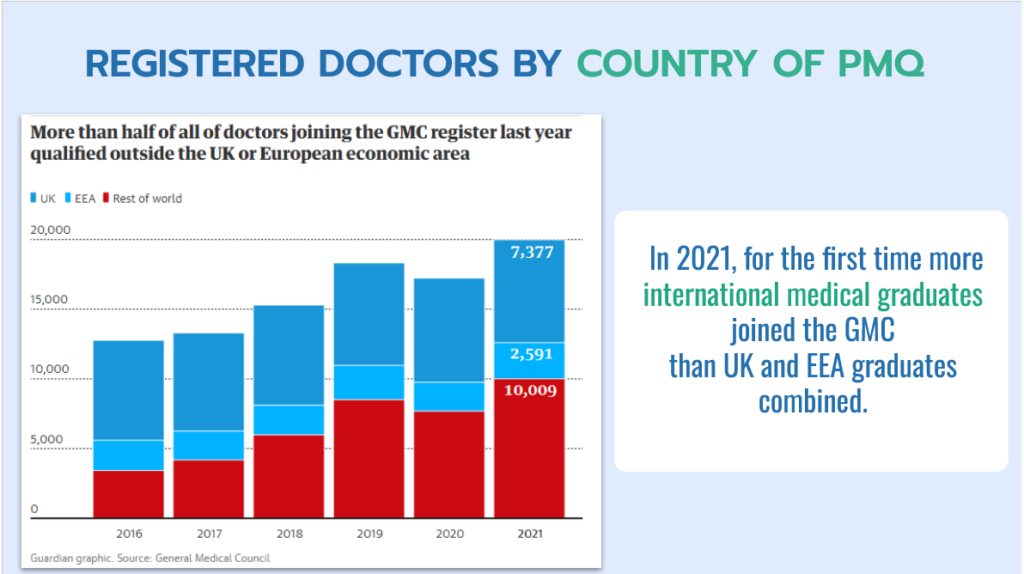Why Increasingly More Western Students Choose to Study Medicine Abroad

Getting admitted to a medical school in the UK, USA, Germany, and other Western countries has become extremely difficult simply because there are too many qualified applicants and not enough seats. This isn’t only detrimental to students but also to the future of each of these countries' respective healthcare systems, as they risk losing capable applicants to a lack of available spots.
However, medical students are nothing if not determined and each year an increasing number choose to study medicine abroad to achieve their dreams of becoming a doctor. After all, there are plenty of countries with world-class medical schools that provide a comprehensive education in English. The best part is that once you graduate, you can return home to practise medicine thanks to the internationally recognised diplomas.
In this blog, we’ll give you the reasons that make studying medicine in Eastern Europe an amazing choice for a promising career in medicine, we’ll provide an overview of why students aren’t studying in their home country, and we’ll share statistical data to highlight these trends.
Let’s start at the root.
Why Are Students Not Studying in Their Home Country?
Although the end result is the same, students in each country face a variety of unique challenges when it comes to securing a spot in a medical university.
In the United Kingdom
The lack of places is mainly due to the fact that UK universities have to apply rigorously selective standards, resulting in the exclusion of very capable applicants who are just marginally outperformed by others. Each medical student costs the UK government approximately £200,000+ to train, and there’s simply not enough budget to fund more seats at local medical universities.
There are also many re-applicants, making it difficult for fresh high school graduates to get admission directly after their A-Levels when competing against re-applicants who are older and have more academic achievements, including work & life experience.


The UK typically has around 7,000-9,000 available places for medicine annually. Although there is a large number of graduates joining the workforce each year, the fact is that the UK needs many more doctors to meet the EU average. Many other countries are also in this position, and this was especially felt and highlighted during the outbreak of COVID-19 and the following years.
The shortage of doctors in the UK is also heavily impacted by dissatisfaction with the National Health Service (NHS) working conditions, meaning the NHS is experiencing a shortage of doctors yearly. 79% of UK working doctors often think about leaving the NHS.
The NHS needs a stable influx of capable doctors, which is why overseas-trained graduates have been welcomed with open arms by local hospitals needing to fill their vacancies. Each year an increasing number of international medical graduates join the UK workforce, providing vital relief and support to the healthcare system.


In Germany
In Deutschland, a large number of students are stopped by the “numerus clausus” system. Basically, these are rules that set strict limits on the number of students who can enroll in universities based on the capacity of medical faculties. Additionally, German medical schools have a very selective admission process with high entry requirements, which only allows a small part of the candidates to secure a spot.
The worst part is that even if you do get accepted, the high demand for medical education combined with limited slots often means that even highly qualified students might face years of waiting before they can start their medical training.
In 2020 alone, more than 134,000 German students chose to study abroad, of which about 5% are medical students. The number increases each year, and about 7,500 students (8% of total German medicine students) have decided to study medicine abroad.
In the United States
In the US, the cost of medical education is a major contributing factor that leads students to exploring options elsewhere. After all, higher education in the United States is one of the most expensive in the world. Similarly to Germany, waiting time is also a major contributing factor.
An interesting additional reason is that many universities throughout the world especially facilitate American international students. For instance, some med schools, like those in the Caribbean, shape their curriculum to the high standards of the US medical education system.
While some European universities even directly prepare students for the United States Licensing Exam (USMLE). This includes the following universities and more:
- Petre Shotadze Tbilisi Medical Academy in Georgia,
- Charles University, Second Medical Faculty in the Czech Republic.
This gives US students more enticing options to study medicine in many countries throughout the world while still getting a similar education that they would get back home.
Why do so Many Students Choose to Study Medicine Abroad?
There are 4 main reasons that make studying medicine abroad such an attractive option for international students:
1. Educational: Qualifications are Recognised Back Home
a) English-taught Medical programmes in Eastern Europe are accredited and internationally recognised.
The curricula in Europe meet the requirements in Directive 2005/36/EC and 2013/55EC of the European Parliament and the European Council on recognition of professional qualifications, ensuring the education meets the high standards expected. This means that graduates can become successful doctors in many countries across the world.
For example, thanks to the Bologna Process, all medicine and dentistry degrees from EEA countries like Bulgaria, Romania, Poland, etc., are almost automatically accepted and recognised by the General Medical Council (GMC) and the General Dental Council in the UK based on the Directive of Recognition of Professional Qualifications (the Directive) on 31 December 2020. This is a huge advantage for overseas-trained students who want to return to the UK to practise.
Some foreign-trained medical graduates from outside the European Economic Area (EEA) must pass the Professional and Linguistic Assessments Board (PLAB) exam to register with the General Medical Council (GMC). But there’s no need to worry because At Medlink Students, our doctors provide clinical-based preparation classes for this exam as a supplementary element to their medical studies. Generally, these classes are not strictly necessary since the medical knowledge required is covered by English-taught courses at universities abroad.
In the case of US students, there are many universities that offer medicine programmes that are shaped around the US medical education system and specifically prepare students for the USMLE while they’re studying medicine.
b) The quality of education in Eastern Europe meets the EU, UK, and USA’s international standards. This includes theoretical teaching and practical/clinical training, all of which are conducted at high international standards. Students receive a comprehensive education that trains them to become successful doctors or dentists who are ready to contribute to the healthcare system.
c) Many universities offer medicine courses entirely in English to accommodate international students. Additionally, an interesting alternative is choosing a university that also offers the option of studying a foreign language in the curriculum to enrich their portfolio.
To name a few, the European University in Georgia and Tbilisi Medical Academy in Georgia, as well as the University of Targu Mures Medical Campus Hamburg, have programmes that teach in English and also offer supplementary language courses in the local language, German, and more.
This means that students are able to choose a medical school according to their career goals, and once they graduate, they can find work in the country they studied in or in English and German-speaking countries around the world. These additional language classes also help the student to integrate better into the country, even though many locals typically speak English - especially the young locals.
2. Financial
Both tuition fees and living costs are much lower in Europe, especially when compared to the UK or the US. This means that students have a financially viable option to receive an internationally recognised education while also being able to enjoy a high quality of life.
3. Getting admitted is more accessible in Europe
It’s no secret that getting into a medical university in the UK is ruthless due to the high number of qualified applicants and limited number of seats available. About 50% of our Medlink Students applicants come from the United Kingdom precisely because of that. The other 50% come from 80+ countries, including the USA, Canada, Australia, Ireland, Germany, France and more.
Not only are there simply more universities in Eastern Europe (which means a lot more open seats), but some of them don’t have entrance exams, which makes getting accepted a lot more accessible for academically qualified applicants who meet the entry requirements.
Getting admitted to the more popular destinations, like Bulgaria, has become increasingly more competitive due to the large influx of international students, thanks to all the above-mentioned benefits. However, students have many other options: 100+ Best Medical Schools In Europe Taught In English.
Studying medicine is inherently challenging and demanding, requiring students to pass rigorous exams and manage a substantial workload of information and pressure, regardless of whether they study in Europe or the UK. A common misconception is that securing admission to medical school is the most difficult hurdle, after which becoming a doctor is assured.
This belief is partly fueled by the scarcity of available places in UK, German, etc., universities, suggesting that entry is the primary challenge. However, this is misleading; merely gaining admission in any country by meeting entry requirements does not guarantee an easy path to becoming a doctor. Students must diligently meet academic standards and successfully advance through each year of their 6-year MD programmes to truly fulfil their aspirations of graduating as doctors.
4. Personal
Many students choose to study abroad so they can experience student life to its fullest in a new and exciting place. They get to enjoy a totally different culture, make a variety of local and international friends, and get a more diverse clinical experience. Additionally, the students get to live much more comfortably than they would in the UK due to lower living costs.
What do the Statistics Say?
The data can vary widely from country to country, but a common and definitive trend is that studying medicine abroad is on the rise. Eastern European countries welcome more and more international students each year, as evidenced by the universities increasing the number of available seats almost every year.
Medlink Students and GMC Data on International Medical Students
We’ve provided our own statistics based on our experience with thousands of students every year, along with official data that we have gathered from the GMC.


The above shows the number of doctors with a non-UK PMQ who joined the GMC register for the first time between 01 January 2019 and 31 December 2023 and had British nationality on record at that time.
Currently, the UK needs 50,000 new doctors to meet the EU average of doctors per capita.
The UK is very open to internationally trained medical doctors, which includes both British students returning home and international doctors wanting to join the UK workforce. Currently, more than a third of NHS doctors in the UK are overseas trained, and over 10,612 international medical graduates joined the UK workforce in 2023 alone.
Between 7,000 and 9,000 students graduate from UK medical schools per year, and currently, more than 10% of British graduates joining the GMC register have graduated from overseas universities. The total number of British nationals joining the medical register with a non-UK primary medical qualification is increasing significantly every year.
This is information that Medlink Students have gained from our past research into internal data stored by the GMC.
| Estimated starting date of studying medicine (Approx) [dates estimated by Medlink Students] | 2014 | 2015 | 2016 | 2017 |
| ACTUAL Date Registered with GMC | 2020 | 2021 | 2022 | 2023 |
| ACTUAL # of Doctors Registered with GMC | 707 | 827 | 764 | 983 |
This trend highlights the growing interest of British students to join international medical programmes. This can be seen as early as 2013, which was not traditionally recognised as a popular period for studying abroad.
It is expected that more and more British nationals will seek to obtain overseas medical qualifications before returning to the UK to start practising medicine. This promises an even more pronounced impact on future GMC registration figures that will alleviate some of the stress that the NHS has been experiencing.
Other Statistics


| Registration Start Year / PMQ Region | 2022 | 2023 |
| UK | 7,819 | 8,301 |
| EEA | 2,033 | 2,887 |
| International Medical Graduates (IMG) | 11,403 | 15,871 |
| Total | 21,255 | 26,969 |
COVID impact on studying abroad
The popularity of studying medicine abroad has surged in the last 4 years, with a notable increase of over 200% compared to previous years at Medlink Students, particularly since the onset of the COVID-19 pandemic in the UK and globally.
This spike in interest is likely attributed to the heightened focus on healthcare since the pandemic and a growing enthusiasm among individuals to pursue their aspirations of becoming doctors. As more focus was put on healthcare during COVID-19 times, more people became interested in medicine and became more keen on clinging to their desire to become doctors.
Brexit increased students’ interest in non-EEA countries
In 2016, Brexit actually increased the interest of students going to study medicine abroad because the GMC stated they’d be implementing the United Kingdom Medical Licensing Assessment (UKMLA) to all graduates from 2024-25 (originally it was announced to be implemented in 2019, but was later pushed forward to 2024-25). This meant that wherever someone graduates from, they will all be subject to the same rules upon registering in the UK and will need to take this exam.
Presently, graduates from the European Economic Area (EEA) are still exempt from sitting the UKMLA due to bilateral agreements that recognise their qualifications. However, this exemption is becoming less important for candidates since everyone will soon have to sit the licensing exam.
Consequently, we have seen a noticeable shift in student preferences. Whereas students previously (pre-2017) favoured EU countries for medical studies, there is now an increased interest in non-EEA countries offering comparable education at lower costs. This trend reflects a significant change in how students approach medical education in the post-Brexit landscape.
Recent Most Popular Destination to Study Medicine Abroad - Georgia
Over the last 3 years, we’ve noticed that over 50% of students expressed interest in applying for medical courses in Georgia, where they used our services to support them with the process of applying and studying in Georgia, mostly at European University in Tbilisi and Tbilisi Medical University.
These universities particularly appeal to UK students because they welcome international students and constantly try to tailor their teaching approach to meet their expectations. Their fees are also more affordable than the average fees in EEA countries that teach medicine in English.
Other non-EEA countries, which have become popular over the last few years, are
- Serbia - Novi Sad University
- Caribbean - University of Health Sciences School of Medicine in Antigua & Barbuda (UHSA)
- Bosnia & Herzegovina - University Of East Sarajevo Faculty Of Medicine
All of which have graduates who have registered to work in the UK successfully.
UK Students’ interest peaks in August
On A-level results day in mid-August every year, we get a 300% influx of students approaching Medlink Students. Future doctors are exploring last-minute alternative pathways to pursuing medicine abroad. This interest often stems from students not meeting their conditional offers for UK universities by a slight margin, such as achieving an A instead of an A* or a B instead of an A.
It's important to recognise that students' potential shouldn't be dismissed by UK universities based on a single grade discrepancy, as this can unjustly ruin their aspirations to become doctors. In Europe, students are afforded the chance to pursue medical studies without the need for A* grades, providing them with an opportunity to demonstrate their suitability for the medical profession by passing every year of the rigorous 6-year course.
This approach emphasises the value of a holistic approach that includes determination and academic and personal resilience throughout the 6-year course rather than just one element, such as having perfect academic records.
Interest in new regions
The growing interest in studying medicine abroad has notably boosted the Caribbean's appeal as a desirable destination by about 30%. Currently, approximately one out of every four students expresses a desire to study in the Caribbean.
Our statistics also show that 35% of students who seek our professional help to study abroad have previously earned a Science or Healthcare degree in the UK. This also plays an important factor in why the Caribbean graduate entry system into medicine is popular.
Students can use their Science-related degree to get admitted into a 4-year medicine course rather than the typical European pathway, which is 6 years. Students with A-levels can study the medicine course for as short as 5 years. Caribbean universities, like the University of Health Sciences School of Medicine in Antigua & Barbuda (UHSA) , generally follow the American system of studying medicine, which is 4 years long. This is completely acceptable for meeting the UK’s criteria for overseas training.
Do Students Face Any Challenges When They Return Home After Studying Medicine Abroad?
Generally, students who have diligently pursued their studies at recognised universities encounter few significant challenges when integrating into the workforce of their home countries. At Medlink Students, we provide comprehensive postgraduate support to help students navigate future career paths and opportunities.
Interestingly, one potential challenge is that some students may find it difficult to decide whether to return home to practise. Studying abroad often broadens students' perspectives, making them more open to considering practice opportunities in countries other than their home country.
One of the best things that a student can do to get ready to practise medicine is to undertake at least one month of shadowing during their summer holiday in collaboration with their universities. This experience is crucial for gaining insight into the operational systems in their home country. We have observed that the NHS involves numerous systems and Standard Operating Procedures (SOPs) that require extensive paperwork.
Although overseas-trained graduates possess comprehensive medical knowledge, familiarity with the SOPs in the hospitals where they plan to work is essential. This is why Medlink Students recommend spending time in hospitals in their home country to facilitate a smoother integration into NHS systems.
If you would like to read more about organising your own electives abroad, feel free to read our informative blogs on the topic:
How to Organise an Elective in the UK as an Overseas Trained Student - Medlink Students Blog
Exclusive Medical Electives in the USA, UK - Medlink Students Blog
Why are European Schools so Open to International Students?
The reception of international students is very positive in Europe, and all of the countries actively seek and welcome them. This is due to the many benefits for both the students and the host country:
1. Economic contributions
International students make significant economic contributions beyond just tuition fees; they also impact the local economy through their living expenses and travel. In many countries, local students often have access to free or significantly reduced tuition, which can financially strain universities. To address this, universities—with government approval—develop international programmes aimed at attracting foreign students. These programmes not only help balance the universities' financial needs but also increase funding for equipment, technology, and recruiting the best professors.
These courses are meticulously designed to cater specifically to international students, particularly those who intend to practise outside the host country. This strategy is mutually beneficial: universities gain financially, while students receive an education tailored specifically for their professional goals and aspirations to return home with a recognised degree, making it a win-win situation.
2. Improved global reputation and ranking
It's always a positive sign when overseas students come to your country to study at your university - hence, diversity plays an important role here.
The presence of international students can enhance both the global reputation, visibility and the standing of medical schools. A high number of foreign students and successful international alumni can significantly improve a medical school's attractiveness on the global stage.
3. Cultural exchange and internationalisation
While students get to enjoy a new culture when studying medicine abroad, the same can be said for the host country’s students. Having a constant influx of international students from all around the world creates an interesting and welcoming multicultural environment that enriches both campus and community life.
4. Government funding
Many universities receive government funding to secure initiatives aimed at attracting more international students.
5. Improved international collaboration between universities
Medical schools worldwide understand the importance of training doctors who can succeed in an increasingly globalised environment. As such, they form partnerships to facilitate student exchange on English-taught courses (ERASMUS), joint research programmes, joint degree programmes, and more.
Conclusion
The rising trend of Western students going abroad to study medicine is more than just an answer to a problem. It serves to show that high-quality medical education is more accessible than ever, and that you don’t need to graduate from your home country to become a successful doctor.
The positive reception of international students further shows that it’s a mutually beneficial deal for both parties: students receive knowledge, skills and an internationally recognised medical diploma while contributing economically and culturally to their host countries.
As this trend continues to grow, it will continue to strengthen the global medical community and deepen the international ties between students, universities, and nations.
Medlink Students excel in supporting students who have a strong passion for medicine and dentistry and want to study abroad. We’re a team of international doctors who have been in your shoes, and we know what it’s like to go to a foreign place to get your higher education.
We have over 12 years of experience, and we have helped thousands of students just like you. Sign up for a free consultation with one of our expert academic advisors to explore your options for studying medicine or dentistry abroad and make use of our expertise in guiding medical students toward a successful career in healthcare.
Q&A
1. Why do so many students from Western countries choose to study medicine in Eastern Europe?
Students choose Eastern Europe due to the lower costs, more accessible admission processes, and the high quality of education that meets international standards. Moreover, degrees from these countries are widely recognised, allowing graduates to practice medicine in various countries, including their home nations.
2. Are medical degrees from Eastern Europe recognised in the UK and the US?
Yes, medical degrees from Eastern Europe are recognised in the UK and the US. Countries within the European Economic Area (EEA) have degrees that are almost automatically recognised in the UK due to the Bologna process and EU directives. For the US, many universities align their curricula with the USMLE, making it easier for graduates to qualify and practice in the United States.
3. What are the financial benefits of studying medicine in Eastern Europe compared to the UK or the US?
The primary financial benefits include significantly lower tuition fees and living costs. This affordability does not compromise the quality of education, making it a cost-effective option for many students.
4. How do medical schools in Eastern Europe cater to international students?
Medical schools in Eastern Europe offer programs entirely in English, additional language courses, and tailored curricula that meet the standards of Western medical education systems. They also provide a multicultural environment that facilitates diverse clinical and cultural experiences.
5. Can international students practise medicine in their home countries immediately after graduating from a medical school in Eastern Europe?
Yes, but they may need to pass additional exams or complete further registration processes depending on their home country's regulations. For instance, in the UK, graduates from outside the EEA need to pass the PLAB test, while in the US, they must clear the USMLE.
6. What about the quality of life while studying abroad; what can students expect?
Students can expect a high quality of life due to lower living costs. They can also experience a variety of exciting cultures and experiences that will contribute to a fulfilling student experience.
2 comments on “Why Increasingly More Western Students Choose to Study Medicine Abroad”
Leave a Reply

About Medlink Students
Leading international recruitment company for medical students in Europe. British Council Certified Agents. 10+ years of experience and more than 10,000 students advised.









How do Eastern European medical schools meet international standards?
These universities align their curricula with EU directives and international requirements, ensuring high-quality education. We recommend consulting with our advisors for more detailed information.